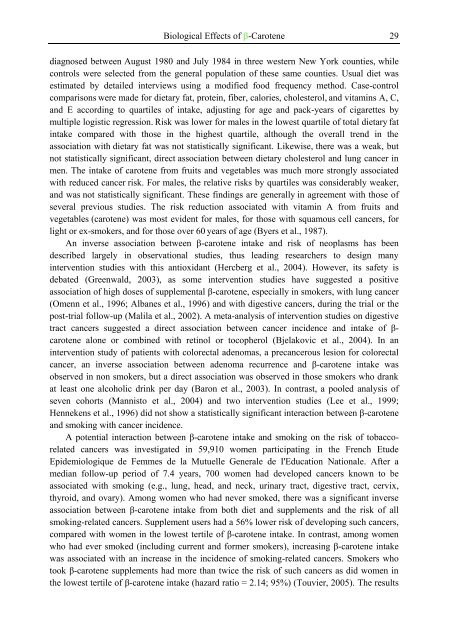Medicinal Plants Classification Biosynthesis and ... - Index of
Medicinal Plants Classification Biosynthesis and ... - Index of
Medicinal Plants Classification Biosynthesis and ... - Index of
Create successful ePaper yourself
Turn your PDF publications into a flip-book with our unique Google optimized e-Paper software.
Biological Effects <strong>of</strong> -Carotene<br />
diagnosed between August 1980 <strong>and</strong> July 1984 in three western New York counties, while<br />
controls were selected from the general population <strong>of</strong> these same counties. Usual diet was<br />
estimated by detailed interviews using a modified food frequency method. Case-control<br />
comparisons were made for dietary fat, protein, fiber, calories, cholesterol, <strong>and</strong> vitamins A, C,<br />
<strong>and</strong> E according to quartiles <strong>of</strong> intake, adjusting for age <strong>and</strong> pack-years <strong>of</strong> cigarettes by<br />
multiple logistic regression. Risk was lower for males in the lowest quartile <strong>of</strong> total dietary fat<br />
intake compared with those in the highest quartile, although the overall trend in the<br />
association with dietary fat was not statistically significant. Likewise, there was a weak, but<br />
not statistically significant, direct association between dietary cholesterol <strong>and</strong> lung cancer in<br />
men. The intake <strong>of</strong> carotene from fruits <strong>and</strong> vegetables was much more strongly associated<br />
with reduced cancer risk. For males, the relative risks by quartiles was considerably weaker,<br />
<strong>and</strong> was not statistically significant. These findings are generally in agreement with those <strong>of</strong><br />
several previous studies. The risk reduction associated with vitamin A from fruits <strong>and</strong><br />
vegetables (carotene) was most evident for males, for those with squamous cell cancers, for<br />
light or ex-smokers, <strong>and</strong> for those over 60 years <strong>of</strong> age (Byers et al., 1987).<br />
An inverse association between β-carotene intake <strong>and</strong> risk <strong>of</strong> neoplasms has been<br />
described largely in observational studies, thus leading researchers to design many<br />
intervention studies with this antioxidant (Hercberg et al., 2004). However, its safety is<br />
debated (Greenwald, 2003), as some intervention studies have suggested a positive<br />
association <strong>of</strong> high doses <strong>of</strong> supplemental β-carotene, especially in smokers, with lung cancer<br />
(Omenn et al., 1996; Albanes et al., 1996) <strong>and</strong> with digestive cancers, during the trial or the<br />
post-trial follow-up (Malila et al., 2002). A meta-analysis <strong>of</strong> intervention studies on digestive<br />
tract cancers suggested a direct association between cancer incidence <strong>and</strong> intake <strong>of</strong> βcarotene<br />
alone or combined with retinol or tocopherol (Bjelakovic et al., 2004). In an<br />
intervention study <strong>of</strong> patients with colorectal adenomas, a precancerous lesion for colorectal<br />
cancer, an inverse association between adenoma recurrence <strong>and</strong> β-carotene intake was<br />
observed in non smokers, but a direct association was observed in those smokers who drank<br />
at least one alcoholic drink per day (Baron et al., 2003). In contrast, a pooled analysis <strong>of</strong><br />
seven cohorts (Mannisto et al., 2004) <strong>and</strong> two intervention studies (Lee et al., 1999;<br />
Hennekens et al., 1996) did not show a statistically significant interaction between β-carotene<br />
<strong>and</strong> smoking with cancer incidence.<br />
A potential interaction between β-carotene intake <strong>and</strong> smoking on the risk <strong>of</strong> tobaccorelated<br />
cancers was investigated in 59,910 women participating in the French Etude<br />
Epidemiologique de Femmes de la Mutuelle Generale de I'Education Nationale. After a<br />
median follow-up period <strong>of</strong> 7.4 years, 700 women had developed cancers known to be<br />
associated with smoking (e.g., lung, head, <strong>and</strong> neck, urinary tract, digestive tract, cervix,<br />
thyroid, <strong>and</strong> ovary). Among women who had never smoked, there was a significant inverse<br />
association between β-carotene intake from both diet <strong>and</strong> supplements <strong>and</strong> the risk <strong>of</strong> all<br />
smoking-related cancers. Supplement users had a 56% lower risk <strong>of</strong> developing such cancers,<br />
compared with women in the lowest tertile <strong>of</strong> β-carotene intake. In contrast, among women<br />
who had ever smoked (including current <strong>and</strong> former smokers), increasing β-carotene intake<br />
was associated with an increase in the incidence <strong>of</strong> smoking-related cancers. Smokers who<br />
took β-carotene supplements had more than twice the risk <strong>of</strong> such cancers as did women in<br />
the lowest tertile <strong>of</strong> β-carotene intake (hazard ratio = 2.14; 95%) (Touvier, 2005). The results<br />
29


